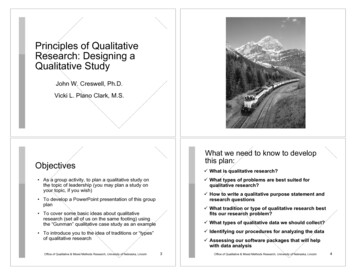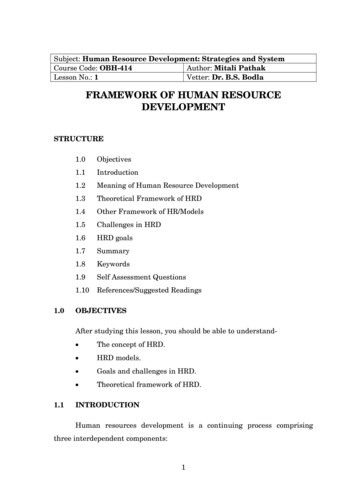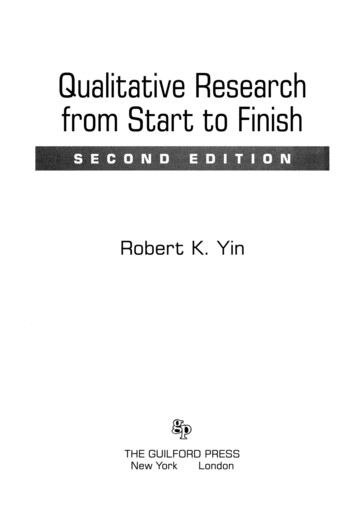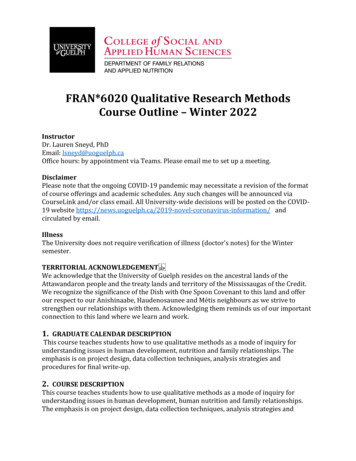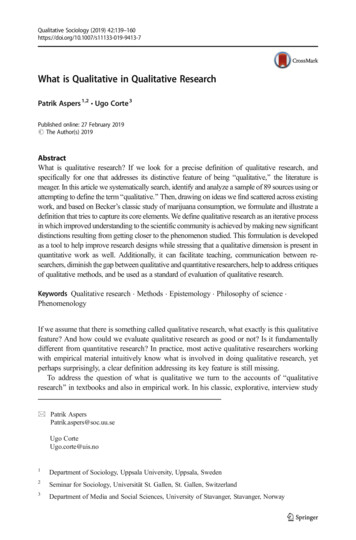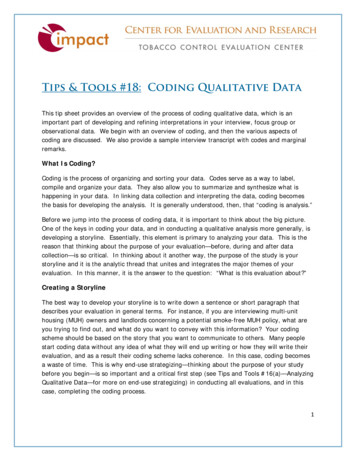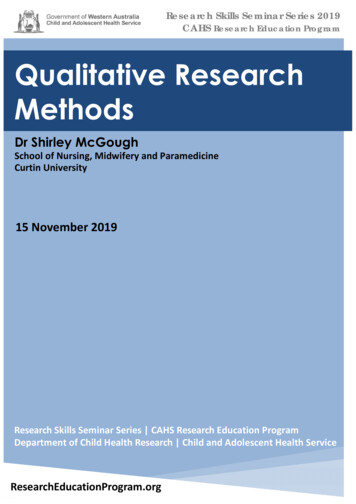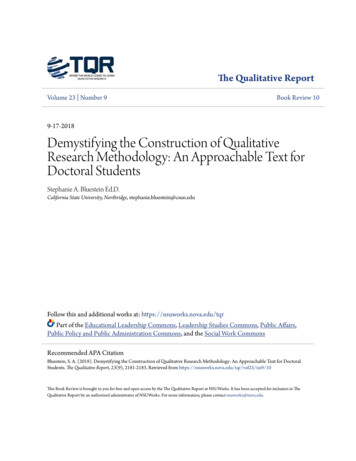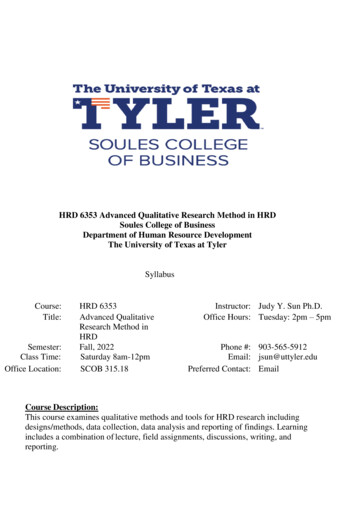
Transcription
HRD 6353 Advanced Qualitative Research Method in HRDSoules College of BusinessDepartment of Human Resource DevelopmentThe University of Texas at TylerSyllabusCourse:Title:Semester:Class Time:Office Location:HRD 6353Advanced QualitativeResearch Method inHRDFall, 2022Saturday 8am-12pmSCOB 315.18Instructor: Judy Y. Sun Ph.D.Office Hours: Tuesday: 2pm – 5pmPhone #: 903-565-5912Email: jsun@uttyler.eduPreferred Contact: EmailCourse Description:This course examines qualitative methods and tools for HRD research includingdesigns/methods, data collection, data analysis and reporting of findings. Learningincludes a combination of lecture, field assignments, discussions, writing, andreporting.
Course Learning Objectives: Understanding the philosophical paradigm of doing qualitative researchUnderstand the contribution of qualitative research in practice, research andtheory buildingUnderstand the basic terminology employed in qualitative inquiryConduct observations in various locations and generate field notesDevelop semi-structured questionnaire for qualitative data collectionTranscribe audio file into transcripts for analysisDevelop coding system for qualitative data analysisReview and apply qualitative research techniques in a variety of settingsPresent research findings from a research projectRequired Textbooks, Materials, and Supplies:Required TextbooksBryman, A., & Bell, E. (2015). Business Research Methods,4th Edition.Oxford, UK: Oxford UniversityMerriam, S. B. & Tisdell, E. J. (2016). Qualitative Research: A Guide toDesign and Implementation. San Francisco, CA:Jossey-Bass ISBN: 9781-119-00361-8Yin, R. K. (2016). Qualitative research from start to finish (2nd edition).New York, NY:Guilford Press ISBN: 978-1-4625-2134-0Recommended TextbooksLincoln, Y. S., & Guba, E. G. (1985). Naturalistic Inquiry. NewburyPark, CA: Sage. Rocco, T. S., & Hatcher, T. (2011). The handbook ofscholarly writing and publishing. San Francisco, CA:Jossey-Bass.Charmaz, K. (2006). Constructing Grounded Theory: A Practical Guidethrough Qualitative Analysis. Sage.Creswell, J. W. (2009). Research design: Qualitative, quantitative, and mixedmethods approaches, 3rd Edition. Thousand Oaks, CA: Sage.Supplementary ReadingsAdditional readings will be assigned to student for download from the UT TylerLibrary or provided by instructor in Blackboard.
Grading Policy and Criteria to Determine Final Course Grade:Research Problem Statement (Individual)Class Participation (Individual)Research Proposal (group) – Step 1Field Assignment 1: Observation field Notes (Individual) – Step 2Field Assignment 2:Interview Transcript, Memo and Coding scheme (Group)- Step 3Research Project Report (Group or Individual) – Step 420%Final Presentation:Total:10%20%20%10%10%10%100%*Note: Instructor reserves the right to require peer feedback if groups exhibit anydifficulty with collegiality or disharmony which interferes with their ability tofunction in a positive and timely manner.Students will be evaluated on the basis of the quantity, quality, and timeliness of thefollowing efforts.1. Attendance and active participation in classes, including all online and classroomdiscussions and activities.2. Quality writing assignments3. Clear and professional class presentations.A (90-100 %)Excellent work and evidence of achieving each of the learningobjectives at an expert levelB (80-89 %)Good work and evidence of achieving each of the learningobjectives at a mastery levelC (70-79 %)Average work and evidence of achieving each of the learningobjectives at a modest levelD (60-69 %)Poor work and little or no evidence of achieving each of thelearning objectivesF (59 % & below) Unacceptable work and no evidence of achieving each of thelearning objectivesClass Meeting Dates:Aug. 27:Sep. 24:Oct. 15:Nov. 5:Dec. 3:8am-12pm8am-12pm8am-12pm8am-12pm8am-12pm
Brief Description of Major AssignmentsQualitative Research Proposal (20%)In a group of 2, please choose a topic of interest within the context of anorganization for your qualitative research project. Students will submit a projectproposal to the Instructor and it must be approved before collecting any data. Theproject will encompass the identification of a problem, the research purpose, at leastone research question, background information and review of relevant literature,qualitative method(s) of collecting data, source of data, how to analyze data andreport of findings, and potential implications for HRD practice and research. Pleaseemail the research report (in APA 7th ed. format) to the instructor before midnightOct. 15, 2022.Field AssignmentsStudents will complete field assignments including observations and interviewswith individuals in an organizational setting, data collection from existingdocuments from an organization. Every student is required to conduct an interview(individually or together with the team) and participate in observation notes andinterview transcripts writing. Field assignments will account for 30% of semestergrade and is a vital part of practice and application of the techniques covered incourse sessions. Completion of 2 field assignments is required for students toreceive credit in this course.1. Field Observations (Individual Assignment, 10%):Review the Handout of “Documenting Observations and Interpretations of FieldExperience”. Go to a public and interactive place (e.g., coffee shop, small market,convenience store), or, to an academic setting, e.g., skills lab or computer lab,where you can have the opportunity to observe and listen. Stay in this observationarea for about 30 minutes. Note the activities and behaviors of the people in thearea.Document the activities you observed, how people engage in those activities, howthey talk about what they are doing (verbal, non-verbal language), and how theyinteract with others. What were your impressions based on your observations andwhat you heard? What are the limitations of listening and observing? Address theseusing the handout as a template. Due: Midnight Sept 24, 2022.2. Interview transcripts and coding scheme (10%)Working as individual or as a group of two, develop a semi-structured interviewguide according to the research questions developed in your research proposal,identify research participants, conduct 2-3 interviews (30-60 minutes for eachinterview), and complete your interview transcripts. Code the transcriptsindependently and consolidate the codes into a coding scheme. Submit yourtranscripts and final coding scheme before midnight November 5, 2022.
Qualitative Research Project (20%)Working in a group of two or individually, deliver a research paper on a topic ofinterest regarding qualitative research. The paper could be either an empiricalqualitative research paper or a methodology related theoretical paper. The empiricalpaper should encompass the identification of a problem, the research purpose,research questions, background information and review of relevant literature,qualitative method(s) of collecting data, source of data, data analysis, credibility ofthe research method, reporting of findings, and discussions and implications forHRD practice and research. Please submit the research report (in APA 6th ed.format) to the instructor before 12:00pm Dec. 3, 2022. Students may work alone orin a group of no more than two.Class Meeting Attendance Attending all five class sessions demonstrates thelearner’s personal commitment to learning. Therefore, physical attendance is expectedfor the accomplishment of course objectives. The facilitator recognizes that learnersmay have special issues and responsibilities that may impact physical attendance. Ifphysical absences occur, the learner is responsible for contacting the facilitator inadvance so that adjustments can be made to the instructional activities planned for aspecific session. With approval from the instructor and the department chair, thelearner may participate virtually. The instructor may provide limited access to theclass through Zoom. However, it is the learner’s responsibility to arrange with an inclass peer to provide virtual access to the class to ensure the quality of classroomlearning. The learner is responsible for all work that is missed due to their absencefrom any class meeting, or portion thereof. It should be expected that physical absencefrom classes for reasons other than documented illnesses, emergencies, or othermatters that prohibit the learner from traveling due to COVID restrictions may affectthe final course grade. Excused absences for religious holy days or active militaryservices are also permitted according to the policies outlined in the UT Tyler GraduateHandbook. One unexcused absence may result in a final grade reduced by one lettergrade. Two or more unexcused absences from class will likely result in a grade ofIncomplete (I) requiring the student to retake the course.Late Work PolicyWork submitted past the due date is 20% per calendar day includes weekend.Writing ExpectationsThis course has numerous written assignments. Each should be free of spelling andgrammatical errors as well as sufficient organization, and the citing of sources andreferences according to APA 7 guidelines. If a student needs assistance withproofreading or basic skills, they should contact UT-Tyler Writing Center, BUS202, (903) 565-5995, email: utwritingcenter@gmail.com
ACADEMIC DISHONESTY STATEMENTThe faculty expects from its students a high level of responsibility and academichonesty. Because the value of an academic degree depends upon the absolute integrityof the work done by the student for that degree, it is imperative that a studentdemonstrates a high standard of individual honor in his or her scholastic work.Scholastic dishonesty includes, but is not limited to, statements, acts or omissionsrelated to applications for enrollment of the award of a degree, and/or the submission,as one’s own work of material that is not one’s own. As a general rule, scholasticdishonesty involves one of the following acts: cheating, plagiarism, collusion and/orfalsifying academic records. Students suspected of academic dishonesty are subject todisciplinary proceedings.University regulations require the instructor to report all suspected cases of academicdishonesty to the Dean of Students for disciplinary action. In the event disciplinarymeasures are imposed on the student, it becomes part of the students’ official schoolrecords. Also, please note that the handbook obligates you to report all observed casesof academic dishonesty to the instructor.UNIVERSITY POLICIES AND ADDITIONAL INFORMATION THAT MUSTAPPEAR IN EACH COURSE SYLLABUSUT Tyler Honor CodeEvery member of the UT Tyler community joins together to embrace: Honor andintegrity that will not allow me to lie, cheat, or steal, nor to accept the actions of thosewho do.Information for Classrooms and Laboratories: Students are expected to wear facemasks covering their nose and mouth in public settings (including classrooms andlaboratories). The UT Tyler community of Patriots views adoption of these practicesconsistent with its Honor Code (Links to an external site.) and a sign of goodcitizenship and respectful care of fellow classmates, faculty, and staff.Students who are feeling ill or experiencing symptoms such as sneezing, coughing,digestive issues (e.g. nausea, diarrhea), or a higher than normal temperature shouldstay at home and are encouraged to use the UT Tyler COVID-19 Information andProcedures (Links to an external site.)website to review protocols, check symptoms,and report possible exposure. Students needing additional accommodations maycontact the Office of Student Accessibility and Resources at University Center 3150,or call (903) 566-7079 or email saroffice@uttyler.edu.
Students Rights and ResponsibilitiesTo know and understand the policies that affect your rights and responsibilities as astudent at UT Tyler, please follow this ibilities.phpCampus CarryWe respect the right and privacy of students 21 and over who are duly licensed tocarry concealed weapons in this class. License holders are expected to behaveresponsibly and keep a handgun secure and concealed. More information is availableat pUT Tyler a Tobacco-Free UniversityAll forms of tobacco will not be permitted on the UT Tyler main campus, branchcampuses, and any property owned by UT Tyler. This applies to all members of theUniversity community, including students, faculty, staff, University affiliates,contractors, and visitors.Forms of tobacco not permitted include cigarettes, cigars, pipes, water pipes (hookah),bidis, kreteks, electronic cigarettes, smokeless tobacco, snuff, chewing tobacco, andall other tobacco products.There are several cessation programs available to students looking to quit smoking,including counseling, quitlines, and group support. For more information on cessationprograms please visit www.uttyler.edu/tobacco-free.Grade Replacement/Forgiveness and Census Date PoliciesStudents repeating a course for grade forgiveness (grade replacement) must file aGrade Replacement Contract with the Enrollment Services Center (ADM 230) on orbefore the Census Date of the semester in which the course will be repeated. GradeReplacement Contracts are available in the Enrollment Services Center or athttp://www.uttyler.edu/registrar. Each semester’s Census Date can be found on theContract itself, on the Academic Calendar, or in the information pamphlets publishedeach semester by the Office of the Registrar.Failure to file a Grade Replacement Contract will result in both the original andrepeated grade being used to calculate your overall grade point average.Undergraduates are eligible to exercise grade replacement for only three courserepeats during their career at UT Tyler; graduates are eligible for two gradereplacements. Full policy details are printed on each Grade Replacement Contract.The Census Date is the deadline for many forms and enrollment actions of which
students need to be aware. These include:* Submitting Grade Replacement Contracts, Transient Forms, requests to withholddirectory information, approvals for taking courses as Audit, Pass/Fail or Credit/NoCredit.* Receiving 100% refunds for partial withdrawals. (There is no refund for these afterthe Census Date)* Schedule adjustments (section changes, adding a new class, dropping without a “W”grade)* Being reinstated or re-enrolled in classes after being dropped for non-payment* Completing the process for tuition exemptions or waivers through Financial AidState-Mandated Course Drop PolicyTexas law prohibits a student who began college for the first time in Fall 2007 orthereafter from dropping more than six courses during their entire undergraduatecareer. This includes courses dropped at another 2-year or 4-year Texas public collegeor university. For purposes of this rule, a dropped course is any course that is droppedafter the census date (See Academic Calendar for the specific date).Exceptions to the 6-drop rule may be found in the catalog. Petitions forexemptions must be submitted to the Enrollment Services Center and must beaccompanied by documentation of the extenuating circumstance. Please contactthe Enrollment Services Center if you have any questions.Disability/Accessibility ServicesIn accordance with Section 504 of the Rehabilitation Act, Americans with DisabilitiesAct (ADA) and the ADA Amendments Act (ADAAA) the University of Texas atTyler offers accommodations to students with learning, physical and/or psychologicaldisabilities. If you have a disability, including a non-visible diagnosis such as alearning disorder, chronic illness, TBI, PTSD, ADHD, or you have a history ofmodifications or accommodations in a previous educational environment, you areencouraged to visit https://hood.accessiblelearning.com/UTTyler and fill out the NewStudent application. The Student Accessibility and Resources (SAR) office willcontact you when your application has been submitted and an appointment withCynthia Lowery, Assistant Director of Student Services/ADA Coordinator. For moreinformation, including filling out an application for services, please visit the SARwebpage at http://www.uttyler.edu/disabilityservices, the SAR office located in theUniversity Center, # 3150 or call 903.566.7079.
Student Absence due to Religious ObservanceStudents who anticipate being absent from class due to a religious observance arerequested to inform the instructor of such absences by the second class meeting of thesemester.Student Absence for University-Sponsored Events and ActivitiesIf you intend to be absent for a university-sponsored event or activity, you (or theevent sponsor) must notify the instructor at least two weeks prior to the date of theplanned absence. At that time the instructor will set a date and time when make-upassignments will be completed.Social Security and FERPA StatementIt is the policy of The University of Texas at Tyler to protect the confidential nature ofsocial security numbers. The University has changed its computer programming sothat all students have an identification number. The electronic transmission of grades(e.g., via e-mail) risks violation of the Family Educational Rights and Privacy Act;grades will not be transmitted electronically.Emergency Exits and EvacuationEveryone is required to exit the building when a fire alarm goes off. Follow yourinstructor’s directions regarding the appropriate exit. If you require assistance duringan evacuation, inform your instructor in the first week of class. Do not re-enter thebuilding unless given permission by University Police, Fire department, or FirePrevention Services.Student Standards of Academic ConductDisciplinary proceedings may be initiated against any student who engages inscholastic dishonesty, including, but not limited to, cheating, plagiarism, collusion, thesubmission for credit of any work or materials that are attributable in whole or in partto another person, taking an examination for another person, any act designed to giveunfair advantage to a student or the attempt to commit such acts.i. “Cheating” includes, but is not limited to: copying from another student’s test paper; using, during a test, materials not authorized by the person giving the test; failure to comply with instructions given by the person administering the test;
possession during a test of materials which are not authorized by the person givingthe test, such as class notes or specifically designed “crib notes”. The presence oftextbooks constitutes a violation if they have been specifically prohibited by theperson administering the test; using, buying, stealing, transporting, or soliciting in whole or part the contents of anunadministered test, test key, homework solution, or computer program; collaborating with or seeking aid from another student during a test or otherassignment without authority; discussing the contents of an examination with another student who will take theexamination; divulging the contents of an examination, for the purpose of preserving questions foruse by another, when the instructors has designated that the examination is not to beremoved from the examination room or not to be returned or to be kept by thestudent; substituting for another person, or permitting another person to substitute for oneselfto take a course, a test, or any course-related assignment; paying or offering money or other valuable thing to, or coercing another person toobtain an unadministered test, test key, homework solution, or computer program orinformation about an unadministered test, test key, home solution or computerprogram; falsifying research data, laboratory reports, and/or other academic work offered forcredit; taking, keeping, misplacing, or damaging the property of The University of Texas atTyler, or of another, if the student knows or reasonably should know that an unfairacademic advantage would be gained by such conduct; and misrepresenting facts, including providing false grades or resumes, for the purposeof obtaining an academic or financial benefit or injuring another student academicallyor financially.ii. “Plagiarism” includes, but is not limited to, the appropriation, buying, receiving asa gift, or obtaining by any means another’s work and the submission of it as one’s ownacademic work offered for credit.iii. “Collusion” includes, but is not limited to, the unauthorized collaboration withanother person in preparing academic assignments offered for credit or collaborationwith another person to commit a violation of any section of the rules on scholastic
dishonesty.iv. All written work that is submitted will be subject to review by plagiarismsoftware.UT Tyler Resources for Students UT Tyler Writing Center (903.565.5995), writingcenter@uttyler.edu UT Tyler Tutoring Center (903.565.5964), tutoring@uttyler.edu The Mathematics Learning Center, RBN 4021, this is the open access computer labfor math students, with tutors on duty to assist students who are enrolled in earlycareer courses. UT Tyler Counseling Center (903.566.7254)
This course examines qualitative methods and tools for HRD research including designs/methods, data collection, data analysis and reporting of findings. Learning includes a combination of lecture, field assignments, discussions, writing, and reporting.
